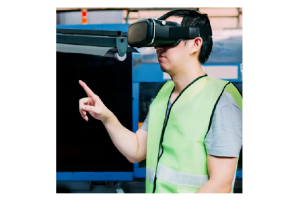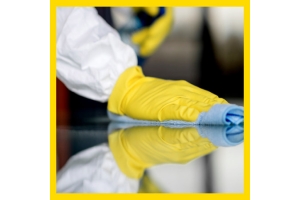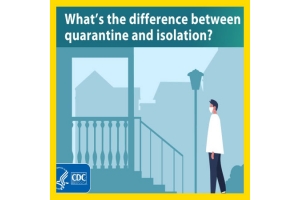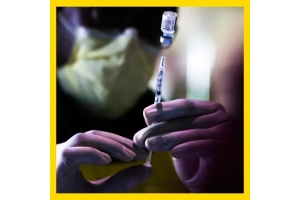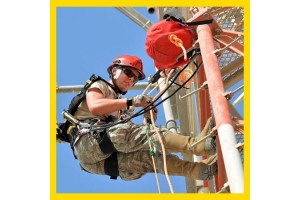Currency
October 17, 2021

As a petite and athletic woman, AMA member Nicole Yedlinsky, MD, has had a constant struggle to find proper fitting personal protective equipment (PPE). Her surgical gowns are too long, and her gloves, safety goggles and masks were too big. While it has been an ongoing issue for Dr. Yedlinsky and so many other physicians and health professionals, it has been increasingly burdensome during the COVID-19 pandemic.
Face masks are typically designed to fit European males without facial hair, impacting the fit for others outside of this profile. It has been found that N95 masks fit about 90% of men, but only 85% of women. This is concerning because improperly fitting PPE sometimes or significantly hampered work for 57% of women, who make up the majority of front-line workers in health care. To that end, the House of Delegates recently directed the AMA to encourage manufacturers to make sure PPE designed to fit everyone.
This is something all too familiar for Saralyn Mark, MD, founder and president of iGIANT— the only nonprofit accelerator in the world for gendered innovation and design—and the American Medical Women’s Association (AMWA) lead on COVID-19. Following the 2014 Ebola outbreak, Dr. Mark designed the blueprint for iGIANT after she noticed that women were being infected with Ebola while wearing and removing PPE which did not properly fit them.

Two decades ago, as a senior medical advisor to the U.S. Department of Health and Human Services’ Office on Women’s Health, Dr. Mark read an internal report that noted the challenges that face masks and respirators posed for coal miners—for women and men with facial hair, signaling that PPE fit has been an ongoing issue.
“The pandemic is shining a light on several areas that we knew were a problem previously, whether it's PPE fit, physician burnout, or gender equity , the last exemplified by women physicians continuing to do the majority of work at home,” said AMA member Kimberly J. Templeton, MD, professor and vice chair of diversity in the orthopaedic surgery department at the University of Kansas Medical Center and past-president of the AMWA. She is also a member of the AMA Orthopaedic Section Council.
“All of these areas we knew were issues; the pandemic has just highlighted these and raised more awareness. And hopefully that will result in spurring more people to action,” Dr. Templeton added.
“For the gowns, I end up having them cinched down around me and that at least allows me to maneuver and do what I need to get the job done,” said Dr. Yedlinsky. “With the mask, it was eventually finding one that fit.”
“The other workaround for a lot of us was we paid out of pocket for different PPE that would work in the environment and didn’t get in the way because, of course, if your goggles are constantly fogging up, it’s not going to work very well for you,” she said.
It’s been documented that obtaining smaller size of PPE has been more difficult during the pandemic due to shortages in supply.
“I still do patient care and deliver babies, so getting into the gowns—especially for those moms who were COVID positive—was particularly challenging,” said Dr. Yedlinsky, a family and sports medicine physician at the University of Kansas Health System in Kansas City. “They make the PPE fit the largest common denominator when it comes to the gowns … and that can be quite a struggle for someone who is on the smaller side.
“When it came time to get fitted for the N95 respirator, I had a struggle with finding one that would fit my face,” she added. “I had to go through two or three different ones before they found one that would fit me and then, initially, they ran out of that one, so I had to go get fitted for another one.”
“I've had patients who came in for symptoms and needed to be swabbed, and some of our laboring patients who were in for deliveries who were COVID positive at the time,” said Dr. Yedlinsky.
“Medicine itself can be mentally draining because it's a lot of problem solving and figuring things out,” she added. “But then when you add on those actual physical layers that you need to wear, and particularly when those physical layers don't fit well, it takes an extra toll because you're having to perform at the same level of mental output while also dealing with that physical drain on your body.”
“The first step toward innovation is to raise awareness of these critical issues. This can be accomplished through publications, presentations and even social media,” said Dr. Mark. “Additionally, iGIANT hosts roundtables and summits with representatives from academia, government, industry and NGOs to raise awareness, share best practices and to empower individuals to become ambassadors for innovation. For example, iGIANT recently co-hosted a summit to address PPE challenges and solutions.”
Because hospitals and health systems “purchase what's available,” it is still their responsibility to protect their employees from known dangers, Dr. Templeton said. Organizations need to be “putting pressure on the manufacturers because they need to be working on some redesigns to make sure that PPE fits everyone.”
“Differences between women and men in body proportions have been found to impact other areas—such as the design and fit of athletic shoes—so problems in the fit of PPE shouldn’t be surprising. N95 respirators are designed for clean-shaven European males, which is great if you're a clean-shaven male of European descent,” said Dr. Templeton. “But if you're a woman, if you have a beard or other facial hair, or if you're wearing a head covering for religious purposes, it may not fit.”
“If we're going to want more diversity in the physician workforce, then we have to make everyone in the workforce feels they have all of the tools that they need to be successful,” echoed Dr. Yedlinsky.
Face masks are typically designed to fit European males without facial hair, impacting the fit for others outside of this profile. It has been found that N95 masks fit about 90% of men, but only 85% of women. This is concerning because improperly fitting PPE sometimes or significantly hampered work for 57% of women, who make up the majority of front-line workers in health care. To that end, the House of Delegates recently directed the AMA to encourage manufacturers to make sure PPE designed to fit everyone.
This isn’t a new issue
This is something all too familiar for Saralyn Mark, MD, founder and president of iGIANT— the only nonprofit accelerator in the world for gendered innovation and design—and the American Medical Women’s Association (AMWA) lead on COVID-19. Following the 2014 Ebola outbreak, Dr. Mark designed the blueprint for iGIANT after she noticed that women were being infected with Ebola while wearing and removing PPE which did not properly fit them.

Two decades ago, as a senior medical advisor to the U.S. Department of Health and Human Services’ Office on Women’s Health, Dr. Mark read an internal report that noted the challenges that face masks and respirators posed for coal miners—for women and men with facial hair, signaling that PPE fit has been an ongoing issue.
“The pandemic is shining a light on several areas that we knew were a problem previously, whether it's PPE fit, physician burnout, or gender equity , the last exemplified by women physicians continuing to do the majority of work at home,” said AMA member Kimberly J. Templeton, MD, professor and vice chair of diversity in the orthopaedic surgery department at the University of Kansas Medical Center and past-president of the AMWA. She is also a member of the AMA Orthopaedic Section Council.
“All of these areas we knew were issues; the pandemic has just highlighted these and raised more awareness. And hopefully that will result in spurring more people to action,” Dr. Templeton added.
Tricks for fit don’t mean it’s OK
When PPE does not fit properly, many have turned to different hacks that help masks or gowns fit better. But that doesn’t mean problem solved.“For the gowns, I end up having them cinched down around me and that at least allows me to maneuver and do what I need to get the job done,” said Dr. Yedlinsky. “With the mask, it was eventually finding one that fit.”
“The other workaround for a lot of us was we paid out of pocket for different PPE that would work in the environment and didn’t get in the way because, of course, if your goggles are constantly fogging up, it’s not going to work very well for you,” she said.
Improper sizing
It’s been documented that obtaining smaller size of PPE has been more difficult during the pandemic due to shortages in supply.
“I still do patient care and deliver babies, so getting into the gowns—especially for those moms who were COVID positive—was particularly challenging,” said Dr. Yedlinsky, a family and sports medicine physician at the University of Kansas Health System in Kansas City. “They make the PPE fit the largest common denominator when it comes to the gowns … and that can be quite a struggle for someone who is on the smaller side.
“When it came time to get fitted for the N95 respirator, I had a struggle with finding one that would fit my face,” she added. “I had to go through two or three different ones before they found one that would fit me and then, initially, they ran out of that one, so I had to go get fitted for another one.”
Improper fit contributes to stress
“I've had patients who came in for symptoms and needed to be swabbed, and some of our laboring patients who were in for deliveries who were COVID positive at the time,” said Dr. Yedlinsky.
“Medicine itself can be mentally draining because it's a lot of problem solving and figuring things out,” she added. “But then when you add on those actual physical layers that you need to wear, and particularly when those physical layers don't fit well, it takes an extra toll because you're having to perform at the same level of mental output while also dealing with that physical drain on your body.”
Raising awareness can help
“The first step toward innovation is to raise awareness of these critical issues. This can be accomplished through publications, presentations and even social media,” said Dr. Mark. “Additionally, iGIANT hosts roundtables and summits with representatives from academia, government, industry and NGOs to raise awareness, share best practices and to empower individuals to become ambassadors for innovation. For example, iGIANT recently co-hosted a summit to address PPE challenges and solutions.”
Because hospitals and health systems “purchase what's available,” it is still their responsibility to protect their employees from known dangers, Dr. Templeton said. Organizations need to be “putting pressure on the manufacturers because they need to be working on some redesigns to make sure that PPE fits everyone.”
PPE design must be inclusive
“Differences between women and men in body proportions have been found to impact other areas—such as the design and fit of athletic shoes—so problems in the fit of PPE shouldn’t be surprising. N95 respirators are designed for clean-shaven European males, which is great if you're a clean-shaven male of European descent,” said Dr. Templeton. “But if you're a woman, if you have a beard or other facial hair, or if you're wearing a head covering for religious purposes, it may not fit.”
“If we're going to want more diversity in the physician workforce, then we have to make everyone in the workforce feels they have all of the tools that they need to be successful,” echoed Dr. Yedlinsky.
